Theros Magic Items
The following weapons were created in the style of the artifacts presented in the Mythic Odysseys of Theros book. They were created using the same format as the weapons and were styled for each of the other gods of the Theros Pantheon that have not received an artifact. These are not in any way official items for D&D or even a card in Magic the Gathering. I created them from what lore I could find on the gods, their relations with mortals, Theros, or other gods. I used various sights and videos talking about the lore of the Gods, or in many cases from Magic the Gathering cards associated with each god. Enjoy!
ALL ART BY u/Agginmad AKA LootTavern
Table Of Contents
- Theros Magic Items
- 2 - Katabasis, Staff of Athreos
- 3 - Bazon, Amphora of Ephara
- 4 - Bulwark of Brotherhood, Shield of Iroas
- 5 - Komidi, Scythe of Karametra
- 6 - Epiphany, Bolt of Keranos
- 7 - Nimoiras, Threads of Klothys
- 8 - Asteri, Cowl of Kruphix
- 9 - Wrathbringer, Axe of Mogis
- 10 - Theneia, Kylix of Pharika
- 11 - Kryvo, Mask of Phenax
- 12 - Gelio, Glaive of Xenagos
- 13 - Godless Artifacts
- 14 - Non-Theros Items
- 15 - Changelog
Athreos, God of Passage
Katabasis, Staff of Athreos
Weapon (quarterstaff), artifact (requires attunement)
Atheros wields Katabasis, a gnarled wooden staff he is never seen without. In Atheros's hands the staff is used to ferry the dead, and only the dead, to the underworld. The living rarely, if ever see Athreos, so it is unknown if he has ever granted his staff to a follower. If he should grant the staff, it would have to be a very special soul that is meant to cross into the underworld.
Staff of Passage. This staff grants a +2 bonus to spell attack rolls and to the saving throw DCs of spells you cast (excluding spells cast from this staff). Additionally, while you are holding the staff you can move through other creatures and objects as if they were Difficult Terrain. You take 5 (1d10) force damage if you end your turn inside an object.
Blessing of Ferryman. If you are a worshiper of Athreos, you gain all the following benefits for which you have the required piety:
Piety 10+. The staff has 1 randomly determined minor beneficial property.
Piety 25+. The staff has 1 additional randomly determined minor beneficial property.
Piety 50+. The staff has 1 randomly determined major beneficial property.
If you aren’t a worshiper of Athreos, the staff has 2 randomly determined major detrimental properties.
See “Artifacts” in chapter 7 of the Dungeon Master’s Guide for details on randomly determined properties.
Ferry. As an action, the staff can be laid down in water, creating a ferry. The ferry uses the statistics of a Galley (see Appendix: Of Ships and the Sea of the Ghosts of Saltmarsh book) with the following changes:
- The ship does not have any weapons.
- The ship can move through other creatures and objects as if they were Difficult Terrain. It and any passengers on board take 5 (1d10) force damage per if it ends its turn inside an object.
The staff can remain in this form for 1 hour or until the attuned creature uses their action to revert the ship back into its staff form. This property cannot be used again until the next dusk.
Spells. The staff has 15 charges. While holding it, you can use an action to expend 1 or more of its charges to cast one of the following spells (save DC 18) from it: spare the dying (0 charges), toll the dead (0 charges), animate dead (3 charges), speak with dead (3 charges), blight (4 charges), create undead (6 charges), finger of death (7 charges). The staff regains 1d12+3 expended charges daily at dawn.
Destroying the Staff. To destroy the staff one must use it against its nature. It is meant to ferry the dead into the underworld. To pervert this and ferry the dead out of the underworld or the living into it breaks the staff down. This process must be repeated at dawn and dusk every day for one month to break the staff completely.

Ephara, God of the Polis
Bazon, Amphora of Ephara
Wondrous item, artifact (requires attunement)
Ephara uses Bazon, a large amphora filled with the power of Nyx. In Ephara's hands she uses Bazon to strengthen a polis warding it from the dangers outside. Should Ephara grant this item to a follower it would be to give them a the power to personally defend a polis and/or the knowledge and ability to make a polis better.
Amphora of the Enlightenment. This amphora grants you +2 to your AC while attuned. Additionally, you are granted enlightenment, you gain proficiency in 4 skills or tools of your choice. When your attunement to Bazon ends you lose proficiency in these skills.
Blessing of of Polis. If you are a worshiper of Ephara, you gain all the following benefits for which you have the required piety:
Piety 1+. The amphora has 1 randomly determined minor beneficial property.
Piety 25+. The amphora increases the user's tremorsense out to 60 feet.
Piety 50+. The amphora has 1 additional randomly determined major beneficial property.
If you aren’t a worshiper of Ephara, the amphora has 2 randomly determined major detrimental properties.
See “Artifacts” in chapter 7 of the Dungeon Master’s Guide for details on randomly determined properties.
Tremorsense. While attuned to the amphora you have tremorsense out to 30 feet.
Spells. The amphora has 10 charges. While holding it, you can use an action to expend 1 or more of its charges to cast one of the following spells (save DC 18) from it: mold earth (0 charges), earth tremor (1 charge), maximlian's earthen grasp (2 charges), wall of sand (3 charges), stoneskin (4 charges), wall of stone (5 charges), move earth (6 charges). The amphora regains 1d6+4 expended charges daily at dawn.
Destroying the Amphora. To destroy the amphora one must deep into the wilds protected by Nylea and pour the blood of the hydra Polukranos and pour it into the stars of Nyx within the amphora. Then the amphora must be pierced with each arrow of Nylea's bow, Ephixis (AC 25) within the span of a minute. Once all four have entered the amphora shatters.

Iroas, God of Victory
Bulwark of Brotherhood, Shield of Iroas
Armor (shield), artifact (requires attunement)
Otherwise known as Fotita, Iroas wields the Bulwark of Brotherhood, a battle-warn but unbreakable shield that has seen uncountable battles. In the hands of the god of victory it is usually used in a spar against the god of slaughter. When Iroas grants his shield to a follower it is usually to let them lead a battle to victory when victory should have been impossible.
Shield of Victory. This shield grants a +2 bonus to your AC. While you wield this shield you gain resistance to your choice of bludgeoning, piercing, or slashing damage. You may choose which type each day at dawn.
Blessing of Victory. If you are a worshiper of Iroas, you gain all the following benefits for which you have the required piety:
Piety 3+. The shield can be used as a melee weapon. The shield has +2 to attack and damage rolls. It deals 1d6 + your Strength modifier bludgeoning damage.
Piety 10+. The shield has 1 randomly determined minor beneficial property.
Piety 25+. The shield has 1 additional randomly determined minor beneficial property.
Piety 50+. The shield has 1 additional randomly determined major beneficial property.
If you aren’t a worshiper of Iroas, the double spear has 2 randomly determined minor detrimental properties.
See “Artifacts” in chapter 7 of the Dungeon Master’s Guide for details on randomly determined properties.
Victor's Defiance. When you take the attack action on your turn you can use your bonus action to make 1 attack with your shield. Additionally, any critical hits against you or allies within 5 feet of you become normal hits.
Destroying the Shield. To destroy the shield it must be used to slay no less than 50 warriors in dishonorable combat, such as a warrior who is not wielding a weapon or cannot fight back. Then it must be taken to the Temple of Malice in the Labyrinth of Skophos and struck with a +3 weapon by the Champion of Mogis.
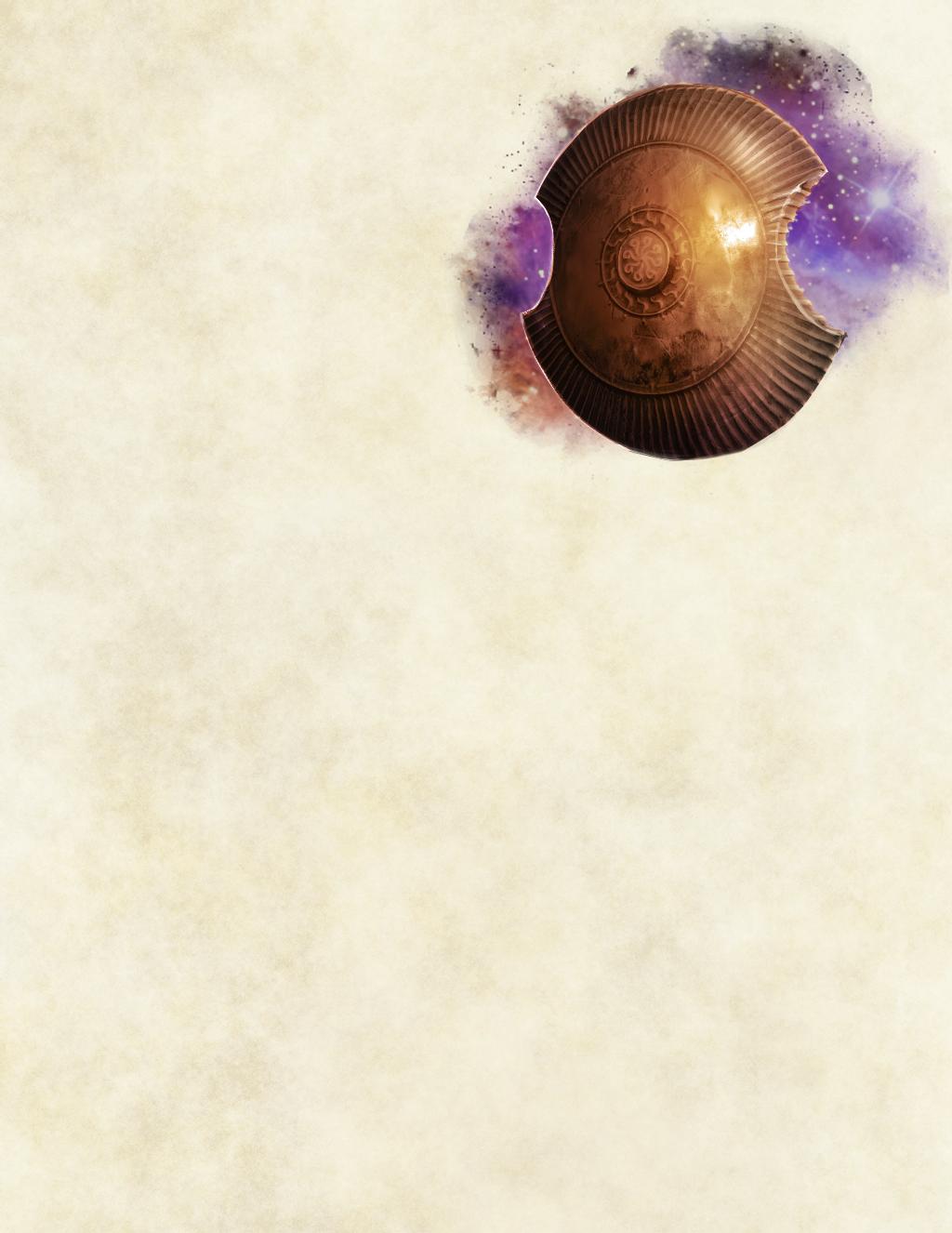
Karametra, God of Harvests
Komidi, Scythe of Karametra
Weapon (glaive), artifact (requires attunement)
Karametra wields Komidi, a scythe meant to harvest the gifts of nature or those who would dare endanger it. In Karametra's hands it changes the land around it, warding off dangerous creatures while allowing mortals who are worthy to harvest nature's bounty.
Scythe of Harvests. This scythe grants a +2 bonus to attack and damage rolls made with it. Whenever you finish a short or long rest you gain temporary hit points equal to half your piety score (minimum of 1, maximum of 25).
Blessing of Abundance. If you are a worshiper of Karametra, you gain all the following benefits for which you have the required piety:
Piety 1+. The scythe has 1 randomly determined minor beneficial property.
Piety 25+. The scythe can cast heroes' feast once. When you finish a long rest roll 1d10. On a 10 the scythe regains this ability.
Piety 50+. The scythe has 1 additional randomly determined major beneficial property.
If you aren’t a worshiper of Karametra, the scythe has 2 randomly determined major detrimental properties.
See “Artifacts” in chapter 7 of the Dungeon Master’s Guide for details on randomly determined properties.
Bronze Sable Companion. While attuned to this weapon you gain an animal companion in the form of a Sable. The Sable obeys your commands as best as it can. It takes its turn on your initiative, though it doesn't take an action unless you command it to. On your turn, you can verbally command the beast where to move (no action required by you). Use the Bronze Sable stat block (Mythic Odysseys of Theros pg. 210) with the following changes:
- The Bronze Sable gains additional hit points equal to twice your character level. Additionally, the creature gains extra hit points equal to your piety score (maximum 50).
- You add your proficiency modifier to the creatures attack rolls.
Spells. The scythe has 10 charges. While holding it, you can use an action to expend 1 or more of its charges to cast one of the following spells (save DC 18) from it: goodberry (1 charge), sanctuary (1 charge), barkskin (2 charges), spike growth (2 charges), plant growth (3 charges), awaken (5 charges), commune with nature (5 charges), tree stride (5 charges), wall of thorns (6 charges). The scythe regains 1d6+4 expended charges daily at dawn.
Destroying the Scythe. To destroy the scythe one must bathe it in the blood of 100 orphans. This corrupts and removes the power of the scythe. Then it must be taken to Erebos’s palace in Tizerus where it must be left without sunlight or water for one year, wilting the scythe to dust.
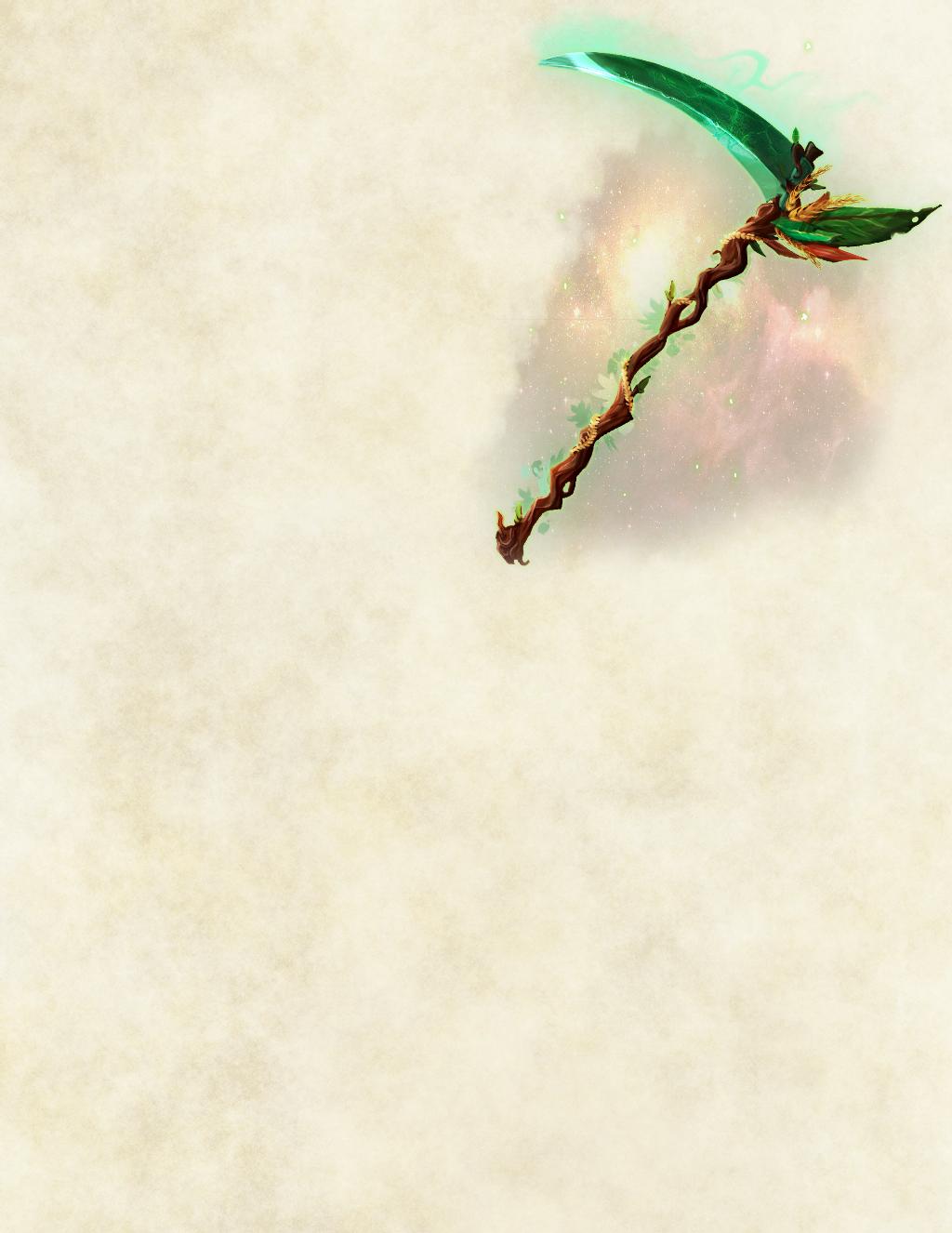
Keranos, God of Storms
Epiphany, Bolt of Keranos
Weapon (javelin), artifact (requires attunement)
Otherwise known by a lesser name, Faneia, Keranos wields the very lightning itself. In Keranos's hands lightning is used to strike down any impetuous mortal who has earned his ire. However, Keranos is not without his favorites, granting inspiration and epiphanies to those who please him. Should he ever decide a mortal has earned more, he may grant Epiphany for a time. However, should this prove the mortal to be too rash, more lightning could solve the issue.
Javelin of Storms. This javelin grants a +2 bonus to attack and damage rolls made with it. Additionally, you deal an extra 3d4 lightning damage with the javelin that also arcs to any enemy creatures within 5 feet of your target. Immediately after the Attack, the weapon flies back to your hand.
Blessing of Storms. If you are a worshiper of Keranos, you gain all the following benefits for which you have the required piety:
Piety 10+. The javelin has 1 randomly determined minor beneficial property.
Piety 25+. The javelin casts the cantrip thunderclap (DC 18) centered on your target whenever you land a critical hit and the javelin has 1 additional randomly determined minor beneficial property.
Piety 50+. The javelin has 1 randomly determined major beneficial property.
If you aren’t a worshiper of Keranos, the javelin has 2 randomly determined major detrimental properties.
See “Artifacts” in chapter 7 of the Dungeon Master’s Guide for details on randomly determined properties.
Epiphany. When you land a critical hit you are given a sudden burst of inspiration and insight. You receive a d12 Inspiration die. Once within the next 10 minutes, you can roll the die and add the number rolled to one ability check, attack roll, or saving throw it makes. The creature can wait until after it rolls the d20 before deciding to use the Inspiration die, but must decide before the DM says whether the roll succeeds or fails.
Once the Inspiration die is rolled, it is lost. You can only have one Inspiration die at a time.
Spells. While the javelin is on your person, you can use an action to cast one of the following spells (save DC 18): lighting bolt (at 5th level), storm sphere, or chain lightning. Once you use the javelin to cast a spell, the spell can’t be cast again from it until the next dusk.
Destroying the Bolt. To destroy the bolt it must be thrust into the heart of the Colossus of Akros, which then must be carried to Purphoros's Forge in Mount Velus and struck with Akmon, Hammer of Purphoros every minute for 1 day to shatter the heart and bolt forever.
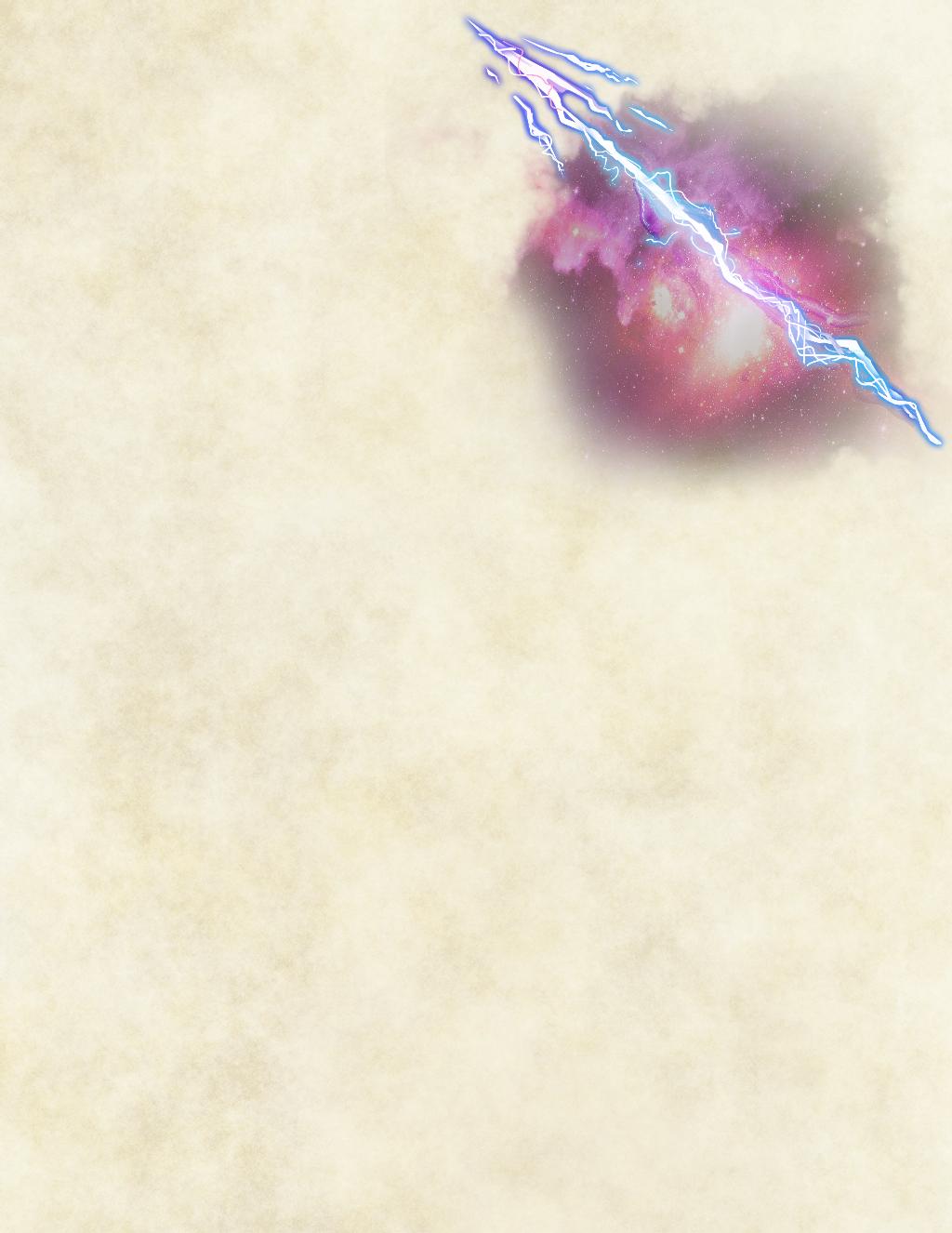
Klothys, God of Destiny
Nimoiras, Threads of Klothys
Weapon (spear), artifact (requires attunement)
Klothys wields Nimoiras, a spear entwined with the threads of fate. In the hands of the god of destiny, she peers across the threads of fate attached to the weapon and her own head, looking up the destiny of mortals and ensuring they are followed. In the most extreme and dire of circumstances she may need to cut the thread with the golden nail on her left thumb. This has never occurred before. Klothys is largely unknown in Theros as she acted as jailer to the Titans, thus she has never granted her weapon to a mortal. If a follower were to be granted Nimoiras it would be to capture someone seeking to escape their destiny or change the destiny of others.
Spear of Destiny. This spear grants a +2 bonus to attack and damage rolls made with it. Additionally, the first time you miss with an attack roll on your turn you may choose to hit instead.
Blessing of Destiny. If you are a worshiper of Klothys, you gain all the following benefits for which you have the required piety:
Piety 10+. The spear has 1 randomly determined minor beneficial property. Additionally, the spear has a reach of 15 feet.
Piety 25+. You are always under the effects of a guidance spell.
Piety 50+. The spear has 1 randomly determined major beneficial property.
If you aren’t a worshiper of Klothys, the spear has 2 randomly determined major detrimental properties.
See “Artifacts” in chapter 7 of the Dungeon Master’s Guide for details on randomly determined properties.
Portent. When you finish a long rest, roll one d20 and record the numbers rolled. You can replace any attack roll, saving throw, or ability check made by you or a creature that you can see with one of these foretelling rolls. You must choose to do so before the roll, and you can replace a roll in this way only once per turn.
Each foretelling roll can be used only once. When you finish a long rest, you lose any unused foretelling rolls.
Spells. The spear has 15 charges. While holding it, you can use an action to expend 1 or more of its charges to cast one of the following spells (save DC 18) from it: gift of alacrity (1 charge), augury (2 charges), fortune's favor (2 charges), divination (4 charges), legend lore (5 charges), scry (5 charges), foresight (9 charges). The spear regains 1d12+3 expended charges daily at dawn.
Destroying the Spear. To destroy the spear one must cut each of the 1d1000 threads entwined in the spear with the golden nail that Klothys wears on her left thump. Then the spear must be thrust into an oracle of any god.
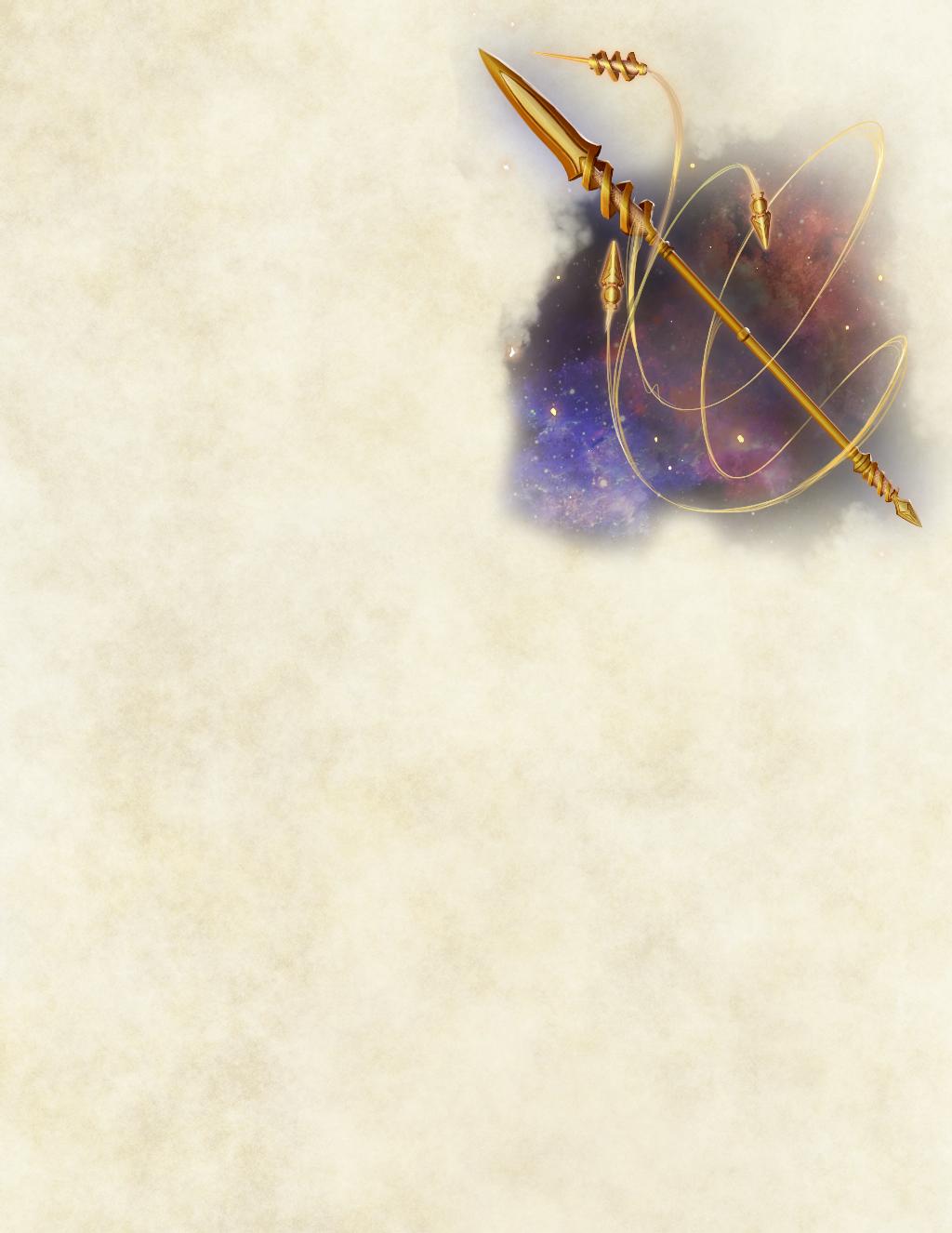
Kruphix, God of Horizons and Time
Asteri, Cowl of Kruphix
Wondrous item, artifact (requires attunement)
Kruphix wears Asteri, a cowl made of Nyx. Kruphix uses this cowl to help govern the cycle of time. He counts few followers among the population so none have been known to receive this power. However, should he grant this item to a mortal it would be to aid all of Theros.
Cowl of Time. This cowl grants a +2 bonus to spell attack rolls and to the saving throw DCs of spells you cast (excluding spells cast from this cowl). Additionally, you have resistance to necrotic and radiant damage.
Blessing of the Timeless. If you are a worshiper of Kruphix, you gain all the following benefits for which you have the required piety:
Piety 10+. The cowl has 1 randomly determined minor beneficial property.
Piety 25+. The cowl has 1 randomly determined major beneficial property.
If you aren’t a worshiper of Kruphix, the cowl has 2 randomly determined major detrimental property.
See “Artifacts” in chapter 7 of the Dungeon Master’s Guide for details on randomly determined properties.
Rewind. You can use your reaction to reroll a saving throw. You must use the new roll.
Spells. The cowl has 15 charges. While holding it, you can use an action to expend 1 or more of its charges to cast one of the following spells (save DC 18) from it: hold person (2 charges), blink (3 charges), haste (3 charges), slow (3 charges), hold monster (5 charges), temporal shunt (5 charges), time ravage (9 charges), time stop (9 charges). The cowl regains 1d12+3 expended charges daily at dawn.
Destroying the Cowl. The only way to destroy the cowl is to unravel it with Klothys's spear Nimoiras, unwinding its destiny, in the very prison of the Titans in the Underworld.

Mogis, God of Slaughter
Wrathbringer, Axe of Mogis
Weapon (greataxe), artifact (requires attunement)
Otherwise known by its lesser name, Orgis, Mogis wields the greataxe Wrathbringer, which is stained with the blood of past kills. In the hands of the god of slaughter it is used to spar against his brother Iroas or to bury it into a mortal Mogis seeks to fight. When Mogis grants his weapon to a follower it would be to further cement their growing savagery. Mogis may even grant the weapon to any warrior in a moment of desperation, trying to draw out their malice.
Greataxe of Slaughter. This greataxe grants a +2 bonus to attack and damage rolls made with it. Additionally, if the target is missing any of its hit points, it deals 1 additional die of damage. If the enemy's hit points are below half their hit point maximum you can reroll the damage once, taking either result.
Blessing of Slaughter. If you are a worshiper of Mogis, you gain all the following benefits for which you have the required piety:
Piety 1+. The greataxe has 1 randomly determined minor beneficial property.
Piety 25+. The greataxe has 1 randomly determined major beneficial property.
Piety 50+. The greataxe has 1 additional randomly determined major beneficial property.
If you aren’t a worshiper of Mogis, the greataxe has 2 randomly determined major detrimental properties.
See “Artifacts” in chapter 7 of the Dungeon Master’s Guide for details on randomly determined properties.
Brutality. You can roll two additional weapon damage dies when determining the extra damage for a critical hit with a melee attack. Additionally, attacks made with this weapon only deal lethal damage.
Mogis's Favor. While attuned to this weapon and in combat horns, cloaked in stars, adorn your head. As a bonus action, you can move up to your speed toward an enemy of your choice that you can see or hear. You must end this move closer to the enemy than you started.
Destroying the Greataxe. To destroy the greataxe it must be used in honorable combat to win the Iroas Games then must be broken against the stone of the Colossus of Akros during a fight against it.
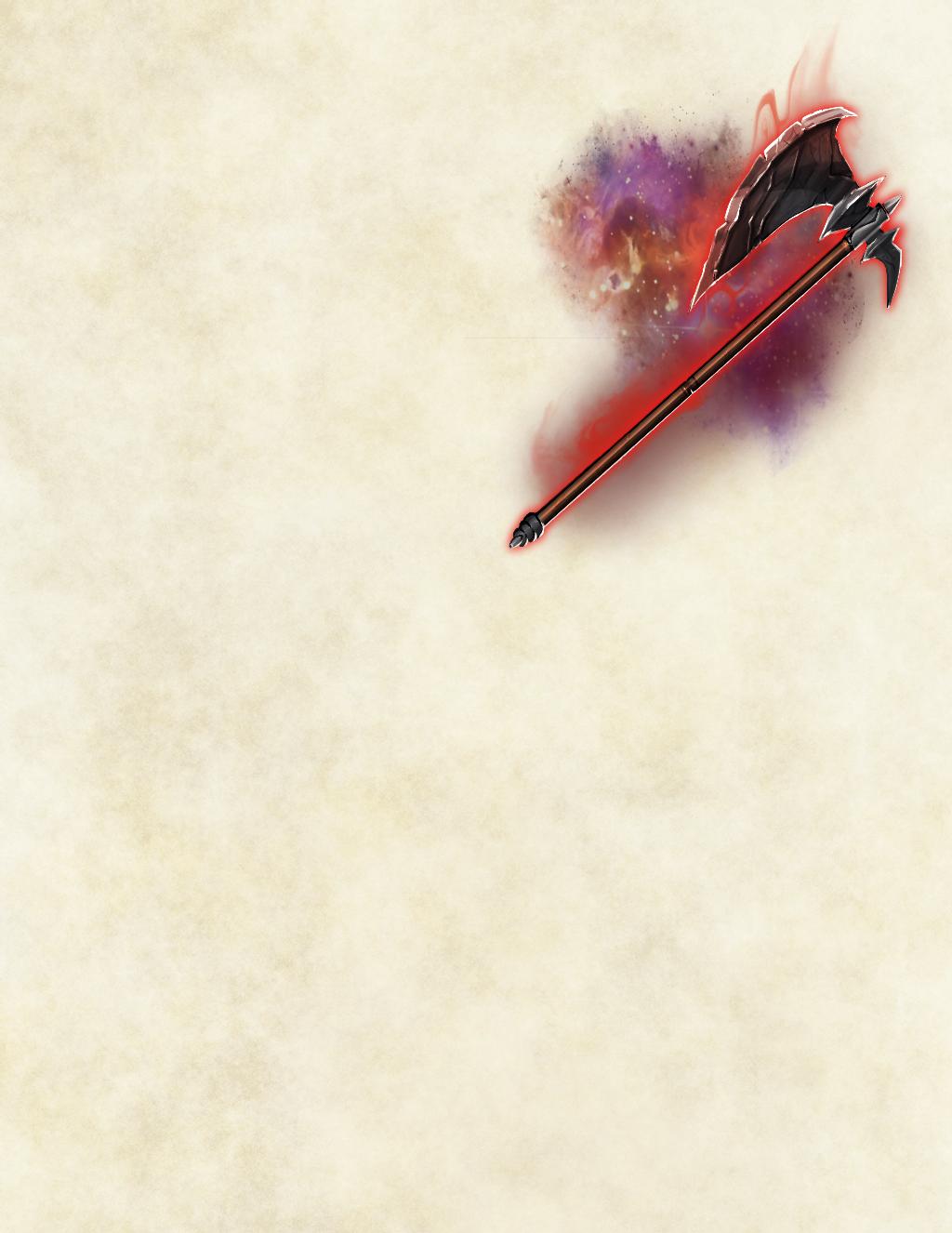
Pharika, God of Affliction
Theneia, Kylix of Pharika
Potion, artifact (requires attunement)
Pharika holds a bowl with her most potent concoctions. To some, it is a potent poison enough to kill any mortal, to others a cure that heals the wounds. For Pharika, it brings diseases, poisons and death to her enemies while empowering, healing, and bringing life to her followers. Should she grant Thenia to a follower, it would be to save one of her own, or to destroy someone who would target her faith and followers.
When you drink this potion you take poison damage equal to your character level and gain the following benefits:
Libation of Affliction. After drinking this potion you regain 2 hit points at the start of your turn for the duration of the effect. Additionally, you gain resistance to poison damage.
Blessing of Affliction. If you are a worshiper of Pharika, you gain all the following benefits for which you have the required piety. For any effect given below treat yourself as the target. For example the weapon targeted for any benefit would be your unarmed attacks or natural weapons and for an increase to your AC your skin hardens from the potion. Roll these effects each time you drink:
Piety 1+. The potion gives 1 randomly determined minor detrimental property-the dangers of this concoction.
Piety 10+. The potion gives 1 randomly determined minor beneficial property.
Piety 25+. The potion gives immunity to poison damage and 1 additional randomly determined minor beneficial property.
Piety 50+. The potion gives 1 randomly determined major beneficial property.
Pharika's Cure. You gain the effects of the greater restoration spell the moment you drink the potion. Additionally, if a creature hits you with a melee attack while under the effects of this potion, the creature takes 5 poison damage. Poison damage dealt by this ability ignores resistances to poison damage. Treat immunity to poison damage as resistance instead.
The effects of the potion last until you complete a short or long rest. The bowl refills each day at dawn.
If you aren’t a worshiper of Pharika, the potion gives 2 randomly determined major detrimental properties.
See “Artifacts” in chapter 7 of the Dungeon Master’s Guide for details on randomly determined properties.
Pharika's Curse. If a creature not attuned to the potion attempts to drink the potion that creature immediately suffers 3 levels of exhaustion. If your attunement to Theneia ends after having drank it, that creature immediately drops to 0 hit points.
Destroying the Libation. Everything malady and poison has a cure on Theros. Even Pharika's. To destroy the libation one must seek out gather a fang from Arasta of the Endless Web and the acidic blood of Polukranos, grinding the fang in the acid. Finally one must acquire the head of Hythonia the Cruel and have it stare at the concoction for 3 days and nights. At the end of the this time the libation will cease to exist.
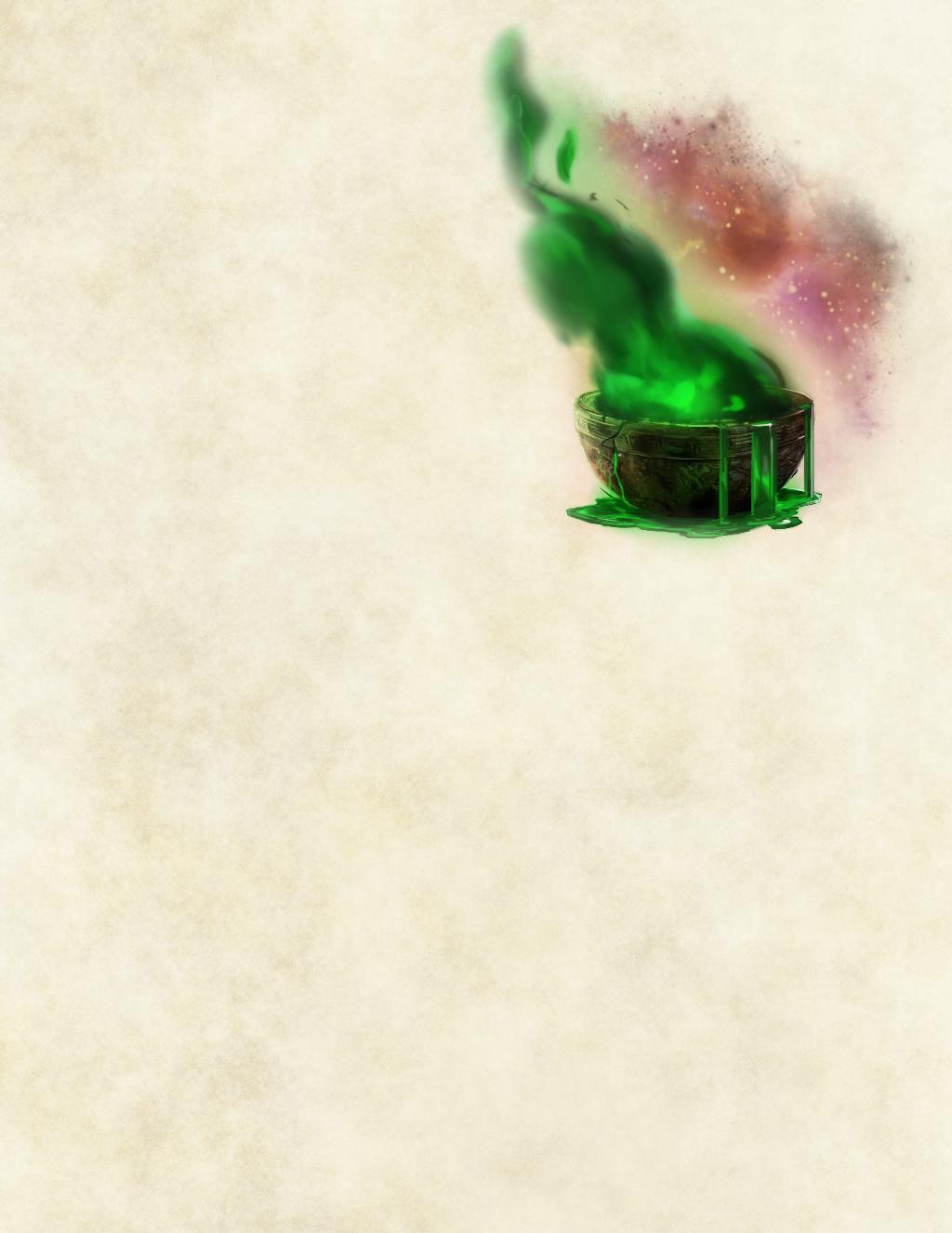
Phenax, God of Deception
Kryvo, Mask of Phenax
Wondrous item, artifact (requires attunement)
Phenax wears Krybo, a golden mask hiding his secrets and lies. In his hands he meddles into the affairs of mortals, spreading lies, coaxing betrayals, and starting wars. Phenax has never been seen without his mask, but given his nature, no one can even be sure it exists at all. Should one of his followers be granted the mask it would be to sow the seeds of betrayal into the hearts of mortals and enact a grand plan with Theros as the stage.
Mask of Deception. This mask grants a +2 bonus to your AC as your form seems to shift and dance. Additionally, no matter what you say, magic that would determine if you are telling the truth indicates that you are being truthful.
Blessing of Lies. If you are a worshiper of Phenax, you gain all the following benefits for which you have the required piety:
Piety 10+. The mask has 1 randomly determined minor beneficial property.
Piety 25+. The mask has 1 randomly determined major beneficial property and 1 randomly determined major detrimental property.
Piety 50+. The mask has 1 additional randomly determined major beneficial property and 1 randomly determined minor detrimental property.
If you aren’t a worshiper of Phenax, the mask has 1 randomly determined major detrimental properties.
See “Artifacts” in chapter 7 of the Dungeon Master’s Guide for details on randomly determined properties.
Liar's Embrace. While you wear the mask, it projects an Illusion that makes you appear to be standing in a place near your actual location, causing any creature to have disadvantage on Attack rolls against you. If you take damage, the property ceases to function until the start of your next turn. This property is suppressed while you are Incapacitated, Restrained, or otherwise unable to move.
Spells. The mask has 15 charges. While holding it, you can use an action to expend 1 or more of its charges to cast one of the following spells (save DC 18) from it: minor illusion (0 charges), disguise self (1 charge), blur (2 charges), invisibility (2 charges), mirror image (2 charges), hallucinatory terrain (4 charges), mislead (5 charges), simulacrum (7 charges), illusory dragon (8 charges). The spear regains 1d12+3 expended charges daily at dawn.
Destroying the Mask. To destroy the mask, one must take it Erebos’s palace in Tizerus. There one must speak a truth of the world while shattering a mask of the Returned within 5 feet of Kryvo every day for 100 days. Finally, one must then find the original Eidolon place the mask upon it and then defeat the creature.

Xenagos, God of Revels
Gelio, Glaive of Xenagos
Weapon (glaive), artifact (requires attunement)
Xenagos wields Gelio, a glaive always with a pair of orangish lights floating within. In his hand it was used to start the greatest of parties or play the best of pranks. He was well known for his ability to whip revelers into a frenzy. Xenagos is said to be dead, but for a creature based in belief who is to say what is permanent. If he were to grant this weapon to a follower it would be for them to finish the Grand Revel, a party of such proportions it threatens to ruin the world.
Glaive of Revels. This magic glaive grants a +2 bonus to attack and damage rolls made with it. Creatures you hit with this weapon must make a DC 18 Wisdom saving throw or have disadvantage on the first attack roll made against you until the end of their next turn.
Blessing of Revelry. If you are a worshiper of Xenagos, you gain all the following benefits for which you have the required piety:
Piety 10+. The glaive has 1 randomly determined minor beneficial property.
Piety 25+. The glaive has 1 randomly determined major beneficial property.
If you aren’t a worshiper of Xenagos, the glaive has 2 randomly determined major detrimental property.
See “Artifacts” in chapter 7 of the Dungeon Master’s Guide for details on randomly determined properties.
Duplicity. Whenever you fall below half your hit point maximum or receive a critical hit the spell mirror image is cast on you, lasting the duration, no concentration required.
Spells. The glaive has 15 charges. While holding it, you can use an action to expend 1 or more of its charges to cast one of the following spells (save DC 18) from it: friends (0 charges), charm person (1 charge), Tasha's Hideous Laughter (1 charge), charm monster (3 charges), enemies abound (3 charges), dominate beast (4 charges), dominate person (5 charges), otto's irresistible dance (6 charges), dominate monster (8 charges). The spear regains 1d12+3 expended charges daily at dawn.
Destroying the Glaive. To destroy the glaive, it must remain untouched in a location without any form of entertainment for one month, then it must cast from Mount Hiastos in Nyx into the depths of the Underworld where it will shatter.

Godless Artifacts/Legendaries
Shadowspear
Weapon (spear), artifact (requires attunement)
The cursed nightmare image of Khrusor, Heliod's Spear pulled from the nightmare of the champion he betrayed. It is every bit as powerful as the original, but horrifically twisted and empowered by those who curse Heliod's name.
Spear of Shadows. This spear grants a +1 bonus to attack and damage rolls made with it. When you hit with an attack using this spear, the target takes an extra 2d8 necrotic damage, healing you for half the necrotic damage dealt.
Godslayer. Damage dealt by this spear ignores resistances and treats immunity as resistance.
Random Properties. Shadowspear has the following random properties:
- The spear has 2 randomly determined minor beneficial property.
- The spear has 1 randomly determined major beneficial property.
- The spear has 1 randomly determined major detrimental property.
If you are a worshiper of Heliod, the spear has 2 randomly determined major detrimental properties.
See “Artifacts” in chapter 7 of the Dungeon Master’s Guide for details on randomly determined properties.
One With Shadows. While in darkness, you are invisible to any creature that relies on darkvision to see you in that darkness. Additionally, you gain darkvision out to 60 feet and can see in magical darkness.
Spells. The spear has 10 charges. While holding it, you can use an action to expend 1 or more of its charges to cast one of the following spells (save DC 18) from it: arms of hadar (1 charge), darkness (3 charges, targeting the tip of the spear only), shadow of moil (4 charges). The spear regains 1d6+4 expended charges daily at dusk.
Destroying the Spear. To destroy the spear, it must be taken to the heights of Mount Hiastos in Nyx, and shattered by the champion of Heliod while they wield Khrusor, Spear of Heliod.
Godsend
Weapon (glaive), legendary (requires attunement)
Originally a sword forged by Purphoros, God of the Forge, known as the Blade of Chaos. It was transformed into a swordspear and named Godsend by Heliod and given to his champion. The weapon appears as a sword with a spear length handle and a crossguard with two glowing gems. The spear radiates with Heliod's light.
You gain a +3 bonus to attack and damage rolls made with this magic weapon. It has the following additional properties:
Blessing of Heliod. When you hit with an attack using this spear, the target takes an extra 2d6 radiant damage.
Banishing Blade. When you hit with an attack using this spear, you can choose to cast banishing smite as part of the attack. You can use this ability once per long rest.
Blade of Chaos. The powers of Heliod cannot completely eclipse the power of a weapon forged by Purphoros. When you land a critical hit you ignore resistances and immunities to necrotic and radiant damage.
Additional Weapons NOT from Theros
Its from God of War but can fit pretty well in Theros (well maybe not the Leviathan Axe, but if Kaldheim is ever introduced to Magic or D&D proper then I will move it there.)
Blades of Chaos
Weapon (twin shortswords), legendary (requires attunement)
The jagged and dark twin blades were forged with hatred and made for warfare. The blades seem to respond to a will for fighting reaching out for an attack, extending on the chains as they unravel from your arms.
Attunement. When you first attune to these swords, chains extend from the hit of the blades and wrap around your forearms. The chains sear you and fuse onto your arms. You take 6d8 fire damage. Additionally, the blades count as a single weapon when it comes to the number of magic items you can normally attune to.
Dormant
While wielding the blades in their dormant state, you gain the following benefits:
- You gain a +1 bonus to attack and damage rolls made with this weapon.
- The weapon has the reach property, extending its range to 10 feet as it extends out on a chain.
- You can use a Bonus Action to speak this magic sword's Command Word, causing flames to erupt from the blade. These flames shed bright light in a 40-foot radius and dim light for an additional 40 feet. While the sword is ablaze, it deals an extra 1d6 fire damage to any target it hits. The flames last until you use a Bonus Action to speak the Command Word again or until you drop or sheathe the sword.
Awakened
When the blades reaches an awakened state, they gains the following properties:
- The bonus to attack and damage rolls increases to +2.
- The weapon's range extends by 5 feet to a total of 15 feet.
- The fire of your weapons now deal 2d6 fire damage to any target it hits.
Exalted
When the blades reaches an exalted state, they gains the following properties:
- The bonus to attack and damage rolls increases to +3.
- The weapon's range extends by 5 feet to a total of 20 feet.
- The fire of your weapons now deal 3d6 fire damage to any target it hits.
Leviathan Axe
Weapon (battleaxe), legendary (requires attunement)
A brilliant large axe of dwarven make. It emanates a cold mist off the blade, and readies to be called back to its owner at any distance.
Dormant
While wielding the axe in it's dormant state, you gain the following benefits:
- You gain a +1 bonus to attack and damage rolls made with this weapon.
- The weapon deals an extra 2d6 cold damage.
- It has the Thrown property with a normal range of 20 feet and a long range of 60 feet. Immediately after the Attack, the weapon flies back to your hand.
Awakened
When the axe reaches an awakened state, it gains the following properties:
- The bonus to attack and damage rolls increases to +2.
- The normal range for the weapon increases to 30 feet and the long range increases to 80 feet.
- As an action you can throw the weapon at an enemy, and on it hit, the enemy must make a DC 15 Constitution saving throw, on a failed save, the enemy is Stunned until the end of your next turn. However, the Leviathan Axe remains lodged in the opponent and does not return to your had until the end of your next turn either. You can call the weapon back to your hand as a bonus action but the enemy immediately loses the stunned condition. You can use this trait once and cannot use it again until you complete a short or long rest. On a successful save the creature is not stunned and the weapon immediately returns to your hand.
Exalted
When the axe reaches an exalted state, it gains the following properties:
- The bonus to attack and damage rolls increases to +3.
- The weapon deals an extra 1d6 cold damage, to a total 3d6 cold damage.
- The normal range for the weapon increases to 45 feet and the long range increases to 100 feet.
- The DC saving throw for your stun is now a 17.
Guardian Shield
Armor (shield), very rare (requires attunement)
A nigh unbreakable shield that is retracts back into the user's gauntlet. You gain the following benefits:
- The shield can be retracted as a bonus action. While retracted your AC does not benefit from the shield but your hand is free. As a reaction when you are the target of an attack you can have the shield expand granting the AC bonus of the shield to the triggering attack. You do not drop what was in your hand at the time, but it cannot be used while the shield is out.
- You gain a +l bonus to AC while the shield is expanded.
Design Notes
Athreos
Name. Already named in the lore.
Weapon Type. His lore says he is never seen without a staff so I chose a staff.
Breakdown. Given that it was a staff I decided to make this one a little more caster oriented and give the wielder a DC increase. Also his lore has him literally not caring about the rest of the pantheon and he is not described as fighting physically ever. As for the piety increments I went with a higher start for the first benefit because he doesn't seem to interact with mortals very much. As for the special ability, his lore talks about him laying down his staff and it becomes the ferry so I went with that since it is really unique. The spells I selected were necromancy spells that prevented resurrection, dealt damage, or raised dead. I let raise dead remain because of a card called Grim Guardian who seems to kill any living who attempt to get on the ferry, so Athreos is not without undead aides.
Destruction. Not an amazing destruction quest, but one meant to go against Athreos's nature and goals. Plus there are a few gods who would not enjoy this act.
Ephara
Name. Greek for Vase (Vazo) but its pronunciation has the symbol for beta. An amphora is a greek jar (think the ones in the Hercules Disney movie. )
Weapon Type. Ephara does carry any weapons, so the choice was a scroll or the vast. The scroll we do not see do anything in the cards, but the vase appears to be pouring out Nyx itself.
Breakdown. Ephara's domain as a god actually covers a lot of things, however her two most prominent seems to be related to the earth, specifically the fortifying of cities (polis) and the advancement of mortals in knowledge and industry. Thus we get the attuned being fortified with an AC increase and the user being enlightened with new proficiencies.
The piety increment was because many people in a city worship Ephara, with her face etched into like every wall of some kind. So a minor boon early makes sense. But after that one must really devote themselves to protecting the polis or advancing knowledge. I have tremorsense because of specifically one card from magic the gathering called Stonewise Fortifier which has the quote that Ephara taught them to "feel every vein in the marble as if it was their own blood". Sounds like tremorsense to me. The spells all revolve around the earth for this same reason.
Destruction. I based the destruction around the amphora on her protecting cities from the wilds of Theros. Nylea is the protector of those wilds and Ephara is the protector of the polis. Kinda similar opposites. Thus, the challenge is the blood of Polukranos and then the having someone with the blessing of the wilds (Nylea's bow) destroy it. It doesn't seem that great, but works for now.
Iroas
Name. Name based in lore. For a more thematic name I gave it this: Greek for Brotherhood (adelfótita).
Weapon Type. Lore points out that he has a double spear and a shield, with the shield being the only one given a name, so rather than have yet another spear, trident, or glaive it made sense to go with the shield.
Breakdown. All these artifacts grant +2 to something for intermediate gods. From the lore the shield took an assault from a minotaur until it fully exhausted itself. Giving it AC and resistance was to display this. For the piety I gave it a standard breakdown but the first one allows you to use the shield as a weapon. This made sense since he is a god of war and victory and the culture that he sponsors the most is a spartan like society.
Given its name I chose to give it an offensive and defensive buff. The defensive one is to give it a reason to have the name Brotherhood.
Destruction. Based on his want for honorable combat there is no greater sin than his weapon being used in dishonorable combat. However, the challenge here is that they must be warriors who aren't given a chance to fight or defend themselves, but cannot be civilians since that wouldn't be combat. Finally, given how Mogis's Champion would likely want to fight the party and that getting through a labyrinth filled with Minotaurs would be a great challenge I decided that it would be sufficient to have the party go there to finally break the shield.
Karametra
Name. Greek for Harvest (Synkomidi)
Weapon Type. Karametra is shown to wield a scythe in her art and she will use it for combat if she must. That weapon is an obvious choice. halberd could also work, but I decided to go with glaive since it is the common depiction of a scythe in D&D.
Breakdown. All these artifacts grant +2 to something for intermediate gods. I decided to invoke Karametra's role as a protector for the scythe and playing on her renewing harvest of abundance by granting temporary hit points after a short or long rest. However, like the Sable this grows with your piety, as I feel given her maternal domain she would want to encourage her followers to remain as pious as possible. A mother's warmth and what not.
Karametra's Temple of Plenty is known to be guarded by these Sables and she even awakened a bronze one in defense of the temple (also why awaken is on the list). She also is depicted to have a very massive Nyxborn one in her card art, so it is very prominent to her, that is why the weapon has a companion. But seeing as though piety plays a part in this, I chose for the creature to get stronger the more pious you are. Thankfully the book has a statblock for them. As for the spells, Nylea is said to hate how Karametra magically infuses the earth and plants with magic. Thus I chose for her to have more nature themed spells. However, sanctuary is on the least because of her motherhood aspect AND the card Karametra's Blessing.
Destruction. Dark. Given her being the protector of orphans it horribly makes sense for that to be what weakens the weapon. Then the underworld is all necrotic so it would do the rest. Don't ever use this destruction you monsters.
Keranos
Name. Named Epiphany already, but I gave it also a more fitting name, Greek for Epiphany (Theofaneia)
Weapon Type. Inspired by his obvious relation to Zeus, and since he is always depicted slinging lightning, I decided to go with another ranged type weapon, the javelin.
Breakdown. All these artifacts grant +2 to something for intermediate gods. I went with a standard bonus damage, but given lightning's chaining nature, decided to add that effect to the weapon allowing the user to have a small area of effect on their attacks. For piety, I went with an increment that is harder to obtain, which is due to Keranos's dislike for mortals and how fickle his boons come. You gotta work for him to like you. I added the thunderclap to give you a further area of effect.
The epiphany trait is due to Keranos's boons he grants to mortals he favors. You are struck with a sudden epiphany or a glimpse of the future that you cannot change. Since the later one is not really actionable (since you cannot change it), I went with the first, giving you a Bardic Inspiration effect without it being an actual Bardic Inspiration.
Destruction. This one sucked when it comes to its destruction. One its lightning. Pure energy. and Two, Keranos doesn't really have any interactions with the other gods so there wasn't anything to play off there. I chose the colossus because it was made of stone to counteract and lock the lightning away, and then decided that it needed to be broken to get rid of it forever. The best place for that is the most dangerous place for such a thing, Purphoros's forge.
Klothys
Name. Greek for Fate (Moiras) Thread (Nima).
Weapon Type. In Calix, Destiny's Hand card art and in Klothys, God of Destiny you can clearly see the spear with the threads of fate leading to daggers. Obviously I went with the spear as the main weapon.
Breakdown. All these artifacts grant +2 to something for intermediate gods. Being a god of destiny, there are fun mechanics around fate and luck that can be played with. The first thing is that destiny is a hard thing to escape or avoid so having the ability to choose to hit once a turn nails that home. The piety is one of the more spaced out versions since Klothys does not require devotion to survive, she just is. I gave the extra reach because of the daggers on the threads of fate. The guidance spell is really nice, but it only applies to ability scores so I felt it fit for you following where destiny leads you.
Granting a portent die was really fun because that is just another way of showing your connection to Klothys. You know AN event will happen that will be good/bad/average, but you don't know WHAT will happen or WHEN. However, you do get to say "Ah! This is what I foresaw..." and the use the portent. The spells all revolve around learning information about someone (which could be stylised as you reading their thread of fate) or as your destiny protecting you and propelling you to further heights. I chose to add some of the new spells from Explorer's Guide to Wildemount because I feel Klothys would be able to have some Dunamancy spells.
Destruction. In Klothys's lore she has that golden nail which is supposed to be the only thing that can cut the threads of fate, so the major trial here is to get that nail. Then the killing of an oracle is just the final slap in the face to break the weapon. How you handle the 1d1000 threads and how often you get to break them is up to the DM.
Kruphix
Name. Greek for Star (Asteri)
Weapon Type. This one was the last and worst to figure out. Kruphix is the most mysterious of the gods and literally is a Nyx silhouette. He has no weapons to his name, and his silhouette doesn't give much to work with. He looks like he has bands or bracelets, four arms, and what appears to be a cowl based on the shape of his head. The bands could work or I could have went wild with the four arms (he has a chosen that has them). But that doesn't really make for an item. So I went with the final option.
Breakdown. As the more spell focused other features of the cowl I chose saving throws as its increase. As for the resistances I based it off the card One with the Stars, where Kruphix turns the creature into stars I decided to go with a Nyxborn trait granting resistances. Much like Klothys, Kruphix does not need devotion to survive so his piety increments are further spaced apart then other gods.
For the special ability I went with a time based rewind allowing you to have advantage (kinda) on a saving throw at the cost of your reaction. For the spells I went with time based things that did not step on the divination based future sight of Klothys.
Destruction. My reasoning here is that Klothys is the only other older god and the only one with a close enough domain to Time. So I wanted to use something from her that would be the this artifacts undoing. As for adding danger, I went with the prison of the Titans, which is likely a powerful and important place in Theros.
Mogis
Name. Already called Wrathbringer, but I also gave it a more fitting Theros name, Greek for Wrathful (Orgisménos).
Weapon Type. He has a big axe. So the choice is greataxe or battle axe, but I decided that greataxe would be more "savage".
Breakdown. All these artifacts grant +2 to something for intermediate gods. Being a god of slaughter it is really compelling to fall back on some kind of rage, but I decided against that. However, given that Mogis likes to try and whisper malice into someone's mind in a fight I went with dealing extra damage as the fight goes on. For the piety I went with these increments because once you give in to Mogis's power it would be hard to get out, so a single piety giving you further enticement would be enough. However, after that you must be REALLY brutal to get the other benefits.
Taking a page out of the barbarian's book I went with a brutal critical style with the weapon. Finally, looking at the card Mogis's Favor you see a normal human with nyxborn horns charging someone. It felt right given his minotaur look to have the original orc's aggressive feat allowing you to charge into battle to your hearts content. Finally, given his savage nature, there is no "non-lethal" attacks for Mogis's weapon.
Destruction. To destroy the weapon I wanted to include Iroas since I included Mogis with Iroas weapon. Iroas has the Iroas Games which is basically like Theros Olympics but gladiatorial in nature. So given his honorable nature, I figured winning the games in honorable combat would be a fun start, but then the real challenge is breaking it upon the Colossus IN combat. It doesn't have to be very serious fight, but CR 23 is no joke.
Phenax
Name. Greek for Hide (Kryvo)
Weapon Type. The only really unique thing about him is a cloak and a mask. I decided to go with the mask. Plus its unique because it is NOT a weapon.
Breakdown. All these artifacts grant +2 to something for intermediate gods. A god of deceit is going to have a lot of things that are about lying, being fake, or misleading so I decided that this could act as a better cloak of displacement, granting both the cloak's ability and a bonus to AC. Additionally, pulling from Glibness your lies always seem like truth.
For his piety I added some extra detrimental properties which plays on his deceit and betrayal of even his followers. Finally his spells all revolve around illusions, making you harder to hit, or making copies of yourself.
Destruction. As for destroying the mask, I played on him being one of the only immortals to ascend to godhood on Theros. He was the "first to escape the underworld". And he has a special connection to the Returned, so I used both of these aspects and truths in the destruction of the mask. Then a second play on his connection to the returned is that his mask SEEMS like it is a mask like theirs so I figured if a DM wants to make the first Eidolon be HIS soul or something, then that plays a neat part. However, something to consider is if this is even the REAL mask to begin with.
Pharika
Name. Greek for Cure (Therapeia) Disease (Astheneia)
Weapon Type. Pharika is only ever depicted with her bowl (kylix). Suffice to say the only choice I found compelling was an artifact potion.
Breakdown. Pharika is a god who holds all afflictions and cures. In medicine, a cure is often a poison with low potency. Thus I tried to make that play out. When you drink it, it is going to deal you a chunk of damage, but then give you a powerful healing effect in the form of regeneration. The powerful effect here is that the regeneration is not stopped while you are above half your hit point maximum. I chose this because you do not get a constant effect from the potion like you do a normal artifact. Also poison damage resistance is obvious.
For her piety I wanted to further call out her duel nature, giving you a minor detrimental property as the first thing you gain, but then you get multiple benefits along the way. There is a card in magic the gathering that is called Pharika's Cure that heals you and deals damage to the enemy. I chose this for one of the major effects, giving you a condition curing heal and making your blood poisonous to enemies. However, since poison is so common for resistance and immunity I gave this the ability to break through. It is the poison of a god after all. The most interesting property I gave this potion is that it gives the randomly determined property directly to the user since they wield no weapon AND each randomly determined property is rolled each time you drink it. I did this because Pharika's concoctions would like be different each time it is brewed, with different ingredients and made in a different way.
I chose to limit the potion duration to a short or long rest because an hour seems too short for this effect but there is no real drawback to the potion having an "until long rest" duration. A drawback is fitting for Pharika. Finally, Pharika's Curse represents the ways to fail at using the potion. You have a more potent drawback for drinking while not being a worshiper since you are ingesting the potion not wielding a weapon. If you don't attune and drink it, (such as having an ally drink it) it backfires. And if you try to drink it and then unattune you lose Pharika's protection from it, possibly killing you.
Destruction. In Theros lore Pharika gave everything a cure. Those cures are just hidden in the most dangerous creatures on Theros. I felt that this could also be how one destroys the Kylix. But that means facing no less then 3 of the most dangerous creatures on Theros. Good Luck!
Xenagos
Name. Greek for Laugh (Gelio)
Weapon Type. So Xenagos wasn't a god for very long, but he is always depicted as wielding a spear/mace like object. Rather than have yet another spear in this pantheon I decided to use its close cousin the glaive.
Breakdown. All these artifacts grant +2 to something for intermediate gods. With Xenagos's penchant for being the life of the party, it would be understandable that he doesn't want to be the target of the attacks he is probably causing. As such, giving him something closer to a sanctuary effect. As for the piety increments, seeing as though he is technically dead, I decided to give him this spacing. This makes it so that if you want him back in the world you have to be really devoted to even get the first benefit, and then since he was such a new god without a lot of followers there can only be so much power he can grant you.
For the secondary buff I decided to go with just a bunch of spells. This gives the wielder plenty of ways to charm others and keep the focus off of the user. I also decided to give the user a small trickery for protection when things take a turn for the worst.
Destruction. Destroying the glaive was a little awkward to come up with. The only real enemy Xenagos had was Elsbeth, but she isn't really a viable way break something since she is a Planeswalker. I decided to play on Xenegoes's need for partying as his antithesis to depower the weapon and then just like himself, it must be case from Nyx into the underworld.
Shadowspear
Name. From the Magic: the Gathering card of the same name.
Weapon Type. Its name tells all.
Breakdown. The card has lifelink so I figured a life drain effect made sense. It deals necrotic damage as the opposite of radiant just like this spear is the opposite of Heliod's. Godslayer trait is directly based off of the fact that the card removes indestructible. This also makes sense considering Elspeth...
The spear is not actually connected to a god so it cannot use piety. Thus it gets the powers automatically, but since it was made from nightmares there should be a drawback, i.e. the detrimental property. I pulled from the gloom stalker ranger for it blessing you with shadows to hide you in the darkness. The spells either mirror Heliod's spear or fit with their dark theme.
Destruction. To destroy the spear I used something close to Khrusor's but with a bit of a twist. And having it use Heliod's spear is the direct opposite of how its actual encounter went.
Godsend
Name. From the Magic: the Gathering card of the same name.
Weapon Type. it is called a sword spear in lore, so I went with the glaive since that seemed to fit the best.
Breakdown. The card gives +3/+3 so I incorporated that as a straight +3 weapon. The card art depicts the blade giving off a holy light so I went with a weaker version of the extra radiant damage on Heliod's spear.
Drawing from the card mechanics again it "exiles" a creature that blocks it. I wanted to turn this into a banishment ability and banishing smite fit the bill perfectly. Finally, I feel like Purphoros's creations being the god of the forge, should not have every aspect of a weapon he makes be overwritten by a different god. Thus pulling from the lore of the original weapon, the Blade of Chaos I gave it the ability to overcome radiant and necrotic resistance and immunity. The reasoning here is that the original blade was "capable of damaging the substance of Nyx". And the Nyxborn supernatural feat gives resistance to those two damage types. I thought that worked perfectly.
Blades of Chaos
Name. Kratos's weapons in the God of War series.
Weapon Type. Given the size of the weapons I think they are too short for a long sword and two long for a dagger. Hence, shortsword.
Breakdown. I made this a "vestige of divergence" style after the latest god of war game's mechanic as the blades get stronger over time. It felt right.
As for the properties I wanted three specific things. Fire damage, reach, and then the standard +1 progression of many other vestiges. Thus you have a flametongue like effect, that starts off weaker than normal but gets stronger than normal eventually. You have a standard +1 progression through the different modes. And finally, you have an increase to the weapons reach that grows with the weapon.
I styled the unique attunement trait because this is two weapons in one but I did not think it should count as two attunements. Additionally the damage is from the super heated chains wrapping around and searing your arms like when Kratos first got them.
Leviathan Axe
Name. Kratos's weapon in the God of War series.
Weapon Type. Given that he wields it one or two hands I went with the battleaxe since it had the versatile property.
Breakdown. I made this a "vestige of divergence" style after the latest god of war game's mechanic as the blades get stronger over time. It felt right.
As for the properties I know the axe had two important traits, cold damage and it could be thrown and then called back to the owner. I gave it the thrown property and it returns like the dwarven thrower and it starts off with some extra cold damage and that only increases in the Exalted form. I also gave it a normal +1 progression across the stages and one of the unique abilities of the axe: to be thrown unto a creature and freeze them for a short time.
Guardian Shield
Name. Kratos's shield in the God of War series.
Weapon Type. Its a shield.
Breakdown. Styled after the effects of the shield in the game and also a little from Percy Jackson, the shield does not take up a hand while retracted letting you dual wield, fire a bow, or use a two hander. But you can make the shield spring out to your defense. Since the shield is part of the gauntlet it does not make you drop a weapon but it still cannot be used since a shield is in the way now.
Changelog
v3.0
12/07/2020
Adjusted lore text a little. Changed Design Note section format. Adjusted hit points values of Komidi, Scythe of Karametra's Bronze Sable to not have randomly determined extra hit points. Adjusted poison damage taken when drinking Theneia, Kylix of Pharika to not be randomly determined.
v2.1
12/05/2020
Added all final images.
v2.0
Can't remember
Changes Iroas's spear to a shield. Added images. Changed the name of a few weapons to match ones revealed in the lore of Mystic Odysseys of Theros. Fixed a few spelling errors. Moved Design sections to the end of the document to make room for images.
v1.1
06/23/2020
Komidi, Scythe of Karametra - Changed companion creature to the Bronze Sable in the Mythic Odysseys of Theros Friends and Foes Appendix. The statblock was removed, since it exists in a book, and the scythe now lists changes to the statblock due to it being a companion creature that gets stronger with piety.
v1.0
06/22/2020
Official Release